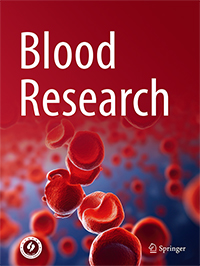Original Article
 Split Viewer
Split Viewer
Blood Res 2017; 52(1):
Published online March 27, 2017
https://doi.org/10.5045/br.2017.52.1.31
© The Korean Society of Hematology
Physicians' preferences and perceptions regarding donor selection in allogeneic stem cell transplantation in Korea when a matched domestic donor is not available
1National Evidence-based Healthcare Collaborating Agency, Seoul, Korea.
2Department of Internal Medicine, Seoul National University Hospital, Seoul, Korea.
Correspondence to : Youngil Koh, M.D. Department of Internal Medicine, Seoul National University Hospital, 101 Daehag-ro, Jongno-gu, Seoul 03080, Korea. go01@snu.ac.kr
Background
A number of alternative donor options exist for patients who fail to find domestic HLA-matched donors for allogeneic hematopoietic stem cell transplantation (allo-HSCT). We assessed physicians' perspectives on allo-HSCT donor selection when a matched domestic donor is not available.
Methods
We administered a questionnaire survey to 55 hematologists (response rate: 28%) who attended the annual spring conference of the Korean Society of Haematology in 2015. The questionnaire contained four clinical allo-HSCT scenarios and the respondents were asked to choose the most preferred donor among the given options.
Results
In all four scenarios, the hematologists preferred a matched international donor over partially mismatched unrelated domestic or haplo-matched family donors. The numbers of hematologists who chose a matched international donor (HLA 8/8) in cases of acute myeloid leukemia, chronic myeloid leukemia, acute lymphoblastic leukemia, and aplastic anemia were 37 (67.3%), 41 (74.6%), 33 (60.0%), and 36 (65.5%), respectively. The important factors that affected donor selection included “expecting better clinical outcomes (40.5%)” and “lower risk of side effects (23.4%).” The majority of participants (80%) responded that allo-HSCT guidelines for donor selection customized for the Korean setting are necessary.
Conclusion
Although hematologists still prefer perfectly matched foreign donors when a fully matched domestic allo-HSCT donor is not available, we confirmed that there was variation in their responses. For evidence-based clinical practice, it is necessary to provide further comparative clinical evidence on allo-HSCT from haplo-matched family donors and fully matched unrelated international donors.
Keywords Hematopoietic stem cell transplantation, Unrelated donor, Surveys and questionnaires
Article
Original Article
Blood Res 2017; 52(1): 31-36
Published online March 27, 2017 https://doi.org/10.5045/br.2017.52.1.31
Copyright © The Korean Society of Hematology.
Physicians' preferences and perceptions regarding donor selection in allogeneic stem cell transplantation in Korea when a matched domestic donor is not available
Min Kyung Shin1, Sangjin Shin1, Ja Youn Lee1, and Youngil Koh1,2*
1National Evidence-based Healthcare Collaborating Agency, Seoul, Korea.
2Department of Internal Medicine, Seoul National University Hospital, Seoul, Korea.
Correspondence to: Youngil Koh, M.D. Department of Internal Medicine, Seoul National University Hospital, 101 Daehag-ro, Jongno-gu, Seoul 03080, Korea. go01@snu.ac.kr
Abstract
Background
A number of alternative donor options exist for patients who fail to find domestic HLA-matched donors for allogeneic hematopoietic stem cell transplantation (allo-HSCT). We assessed physicians' perspectives on allo-HSCT donor selection when a matched domestic donor is not available.
Methods
We administered a questionnaire survey to 55 hematologists (response rate: 28%) who attended the annual spring conference of the Korean Society of Haematology in 2015. The questionnaire contained four clinical allo-HSCT scenarios and the respondents were asked to choose the most preferred donor among the given options.
Results
In all four scenarios, the hematologists preferred a matched international donor over partially mismatched unrelated domestic or haplo-matched family donors. The numbers of hematologists who chose a matched international donor (HLA 8/8) in cases of acute myeloid leukemia, chronic myeloid leukemia, acute lymphoblastic leukemia, and aplastic anemia were 37 (67.3%), 41 (74.6%), 33 (60.0%), and 36 (65.5%), respectively. The important factors that affected donor selection included “expecting better clinical outcomes (40.5%)” and “lower risk of side effects (23.4%).” The majority of participants (80%) responded that allo-HSCT guidelines for donor selection customized for the Korean setting are necessary.
Conclusion
Although hematologists still prefer perfectly matched foreign donors when a fully matched domestic allo-HSCT donor is not available, we confirmed that there was variation in their responses. For evidence-based clinical practice, it is necessary to provide further comparative clinical evidence on allo-HSCT from haplo-matched family donors and fully matched unrelated international donors.
Keywords: Hematopoietic stem cell transplantation, Unrelated donor, Surveys and questionnaires
Fig 1.

Results of donor selection by case scenario.
Fig 2.

Reference for donor selection. Multiple choices were not allowed, but two respondents mistakenly gave multiple responses.
-
Table 1 . Description of each case scenario..
-
Table 2 . Respondent characteristics..
-
Table 3 . Determinants of donor selection..
Multiple choices were allowed..
-
Table 4 . Necessity of the Korean HSCT guidelines..

Article Tools
Stats or Metrics
Related articles in BR
-
Transfusion support in hematopoietic stem cell transplantation
Dong Wook Jekarl, Jae Kwon Kim, Jay Ho Han, Howon Lee, Jaeeun Yoo, Jihyang Lim, Yonggoo Kim
Blood Res 2023; 58(S1): S1-S7 -
Prognostic impact of total body irradiation dose in pediatric acute lymphoblastic leukemia patients treated with allogeneic hematopoietic stem cell transplantation in second complete remission
Wonjin Jang, Suejung Jo, Jae Won Yoo, Seongkoo Kim, Jae Wook Lee, Pil-Sang Jang, Nack-Gyun Chung, Bin Cho
Blood Res 2022; 57(4): 256-263 -
Reduced-intensity conditioning versus myeloablative conditioning allogeneic stem cell transplantation for patients with myelofibrosis
Dong Hyun Kim, Jeongmin Seo, Dong-Yeop Shin, Youngil Koh, Junshik Hong, Inho Kim, Sung-Soo Yoon, Ja Min Byun
Blood Res 2022; 57(4): 264-271




 PDF
PDF Standard view
Standard view Export citation
Export citation Share
Share  Download
Download Previous Article
Previous Article



